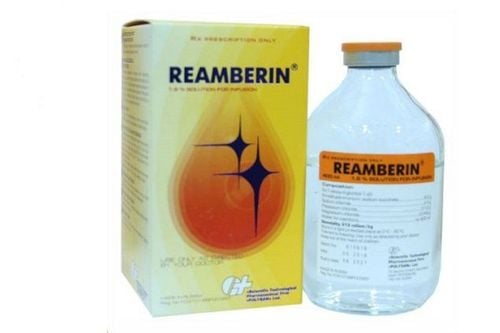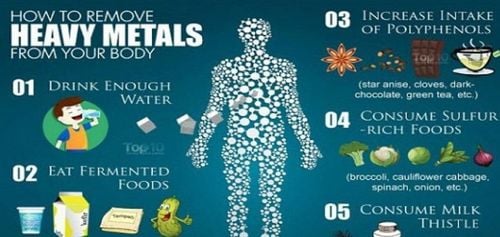This is an automatically translated article.
Heavy metal poisoning can happen when you're exposed to certain metals, making you sick and affecting how your body works. Heavy metals: Arsenic, lead, mercury... are all in the ground we walk on, in the water we drink and in the products we use every day. With most heavy metals high levels can cause health problems.1. What is heavy metal poisoning and poisoning?
Heavy metals belong to elements found naturally in the earth. They are used in many modern applications, such as agriculture, medicine, and industry.Your body even contains some natural. For example, zinc, iron and copper are necessary for the normal functioning of the body, as long as they are not present in toxic amounts. These metals can be classified as heavy metals in food or heavy metals in foods
Heavy metal poisoning usually occurs when the soft tissues of the body absorb too much of a particular metal. The most common metals that the human body can absorb in toxic amounts are: Mercury, lead, cadmium, arsenic...
You can be exposed to these metals in high concentrations at the same time. It is also a factor that results from food, air or water contamination, as well as medicines, food containers with improper coating and quality assurance, industrial exposure or lead-based paint.
In the United States, heavy metal poisoning is rare. It only happens when you're exposed to significant amounts of heavy metals, usually over a long period of time. But the popularity of over-the-counter (OTC) products that claim to detox your body from heavy metals can make it seem more common than usual.
2. Symptoms of heavy metal poisoning
The symptoms of heavy metal poisoning that occur in each individual can vary, depending on the type of metal involved.Common signs and symptoms of some types of heavy metal poisoning include:
Diarrhea Nausea Abdominal pain Vomiting Loss of breath Tingling in extremities such as: Hands and feet Chills Child Children with heavy metal poisoning may have abnormally formed or weakened bones. Pregnant women can also have miscarriages or premature births if they have heavy metal poisoning.
Acute poisoning . This happens if you take high doses all at once, such as in a chemical accident in a factory or after a child swallows a lead toy. Symptoms that usually come on quickly can appear:
Feeling confused Going numb Feeling nauseous and nauseous Going out Abdominal pain Diarrhea Diarrhea Dehydration Tingling Anemia Kidney damage Liver damage Lung irritation Substance fluid in your lungs Brain problems or memory loss Horizontal lines on your fingernails Behavior changes Weak bones or deformities Miscarriage or early labor

Đau bụng, tiêu chảy, buồn nôn là triệu chứng điển hình của ngộ độc kim loại nặng
Symptoms of mercury poisoning:
Lack of coordination Muscle weakness Difficulty hearing and speaking Nerve damage in hand and face positions Changes in vision Difficulty walking Lead poisoning symptoms:
Constipation Onions micro-aggressiveness Sleep problems Irritability High blood pressure Loss of appetite Anemia Headache Fatigue Loss of memory Loss of developmental skills in children Arsenic poisoning symptoms:
Nausea, vomiting and diarrhea Red or swollen skin Pimples or open sores on your skin, such as warts or lesions Irregular heartbeat Muscle cramps Symptoms of cadmium poisoning:
Fever Respiratory problems Muscle pain
3. Causes of heavy metal poisoning
Heavy metals can enter the body in many different ways. For instance, you can consume them in the foods you eat or absorb them through your skin. You should keep in mind that heavy metal poisoning occurs with extensive or frequent exposure, often over a long period of time. Regular exposure will not lead to heavy metal poisoning.Arsenic Work near hazardous waste sites Live in areas with high levels of: rocks, water, and soil Ingestion of pesticides, insecticides or herbicides that all contain arsenic Eat seafood or contaminated algae Drinking contaminated water Cadmium Cadium can get into the body from an industrial work environment, especially where ores are processed or smelted Using solder or soldering metals containing cadmium Inhalation cigarette smoke Lead Lives in homes with high lead applications Do work related to industrial construction, radiator repair or refinery operations Use kohl cosmetics Apply dyes improved hair, despite the U.S. Food and Drug Administration Mercury Mining, manufacturing, or transporting mercury-containing metals Mining and smelting gold and silver ores Consuming contaminated fish or water Contamination Manufacture of mirrors, X-ray machines, incandescent lamps or vacuum pumps Heavy metal poisoning can happen to anyone People and ages vary, but children are more susceptible to poisoning, especially lead poisoning. Old houses that have been painted for a long time sometimes have lead paint. For example, if a child touches a lead-painted wall before touching their mouth, they can be exposed, which can lead to brain damage, because at this point the child's brain is still developing.
However, according to the National Organization for Rare Disorders, the number of children showing signs of lead exposure which is harmful to health has decreased by 85% in the past 20 years.

Bạn có thể ngộ độc kim loại nặng như thủy ngân nếu tiêu thụ cá bị ô nhiễm
4. Diagnosis of heavy metal poisoning
Doctors can usually check for heavy metal poisoning with a simple blood test called a heavy metal panel or heavy metal toxicity test. To perform diagnostic tests for heavy metal poisoning, doctors will take a small blood sample and check it for signs of heavy metals. If you have symptoms of heavy metal poisoning, but if your blood tests show only low levels of heavy metals, your doctor may do some additional testing. These may include:Kidney function tests Liver function studies Urine analysis Hair analysis Nail analysis Electrocardiogram X-rays
5. Treatment of heavy metal poisoning
For mild cases of heavy metal poisoning, simply eliminating your exposure to heavy metals may be enough to treat the condition. Depending on the underlying cause, this may mean taking a break from work or changing your diet.Your doctor can also give you or give you more specific recommendations on how to reduce your exposure.
For more severe cases, the standard treatment is chelation therapy. This involves the use of drugs, either by mouth or by injection, that bind to heavy metals in your body. These antidotes, when they bind with metals, chelators help to remove them from your body as waste.
6. Should I do a heavy metal detox?
There are quite a few tools on the internet to help detoxify heavy metals as well as cleansing procedures that allow the removal of heavy metals from your body. While these may seem like a safer, less expensive alternative to seeing a doctor, these methods are not approved by the U.S. Food and Drug Administration as a method of treatment. Effective heavy metal detox. And most of these methods have not been evaluated for safety or effectiveness to apply on. In addition, some products can prevent heavy metals that can cause a host of other problems, such as:Allergic reactions Mineral deficiencies Birth defects Kidney injury If infected Left untreated, heavy metal poisoning can have lasting effects on health as well as daily life. When there are signs of heavy metal toxicity, it's important to work closely with your doctor to ensure that you're following the most effective treatment plan for your needs.

Nếu nhận thấy mình có dấu hiệu ngộ độc kim loại nặng, hãy liên hệ với bác sĩ ngay lập tức
Make sure your workplace follows OSHA guidelines to avoid metal contamination heavy type. Limit the consumption of fish, especially marine fish, because in variable fish contains higher levels of mercury. Get a lead test if your home was built before 1978. Buy mineral and spice supplements only from trusted, high-quality sources with advice and guidance from your home. doctor. If you need to consult and visit Vinmec Hospitals of the national health system, please book an appointment on the website (vinmec.com) for service.
Please dial HOTLINE for more information or register for an appointment HERE. Download MyVinmec app to make appointments faster and to manage your bookings easily.
Reference sources: webmd.com, healthline.com












